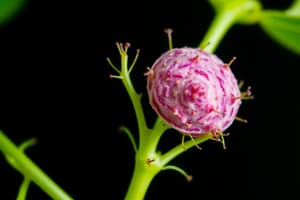Podcast
Questions and Answers
Which type of tissues is responsible for the primary growth of plants?
Which type of tissues is responsible for the primary growth of plants?
- Simple Tissues
- Complex Tissues
- Apical Meristems (correct)
- Permanent Tissues
Simple permanent tissues are made up of multiple types of cells.
Simple permanent tissues are made up of multiple types of cells.
False (B)
What are the three types of meristematic tissues?
What are the three types of meristematic tissues?
Apical, Lateral, Intercalary
The tissue that primarily transports water and minerals in plants is called __________.
The tissue that primarily transports water and minerals in plants is called __________.
Which type of simple permanent tissue provides flexible support in plants?
Which type of simple permanent tissue provides flexible support in plants?
Match the following plant tissues to their primary functions:
Match the following plant tissues to their primary functions:
Sclerenchyma tissue is composed of living cells at maturity.
Sclerenchyma tissue is composed of living cells at maturity.
__________ tissues provide support, storage, and transport of nutrients in plants.
__________ tissues provide support, storage, and transport of nutrients in plants.
Flashcards are hidden until you start studying
Study Notes
Types of Plant Tissues
- Meristematic Tissues
- Composed of undifferentiated cells capable of division.
- Found in growing regions (apical tips, lateral meristems).
- Permanent Tissues
- Comprised of differentiated cells that have specific functions.
- Two main types: Simple and Complex.
Functions Of Plant Tissues
- Meristematic Tissues
- Responsible for the growth of plants.
- Enable the formation of new organs (roots, leaves, flowers).
- Permanent Tissues
- Provide support, storage, and photosynthetic activities.
- Assist in transport (water, nutrients, food).
Plant Tissue Organization
- Simple Tissues
- Made of a single type of cell (e.g., parenchyma, collenchyma, sclerenchyma).
- Functions include storage, support, and protection.
- Complex Tissues
- Composed of multiple cell types (e.g., xylem, phloem).
- Involved in transport of water, nutrients, and food.
Meristematic Tissues
- Types of Meristematic Tissues
- Apical Meristems: Located at root and shoot tips; responsible for primary growth.
- Lateral Meristems: (e.g., cambium); contribute to secondary growth (girth).
- Intercalary Meristems: Found at the base of leaves or internodes; support rapid growth.
- Characteristics
- Cells are small, with thin walls and a high nucleus-to-cytoplasm ratio.
- Capable of continuous division.
Permanent Tissues
-
Simple Permanent Tissues
- Parenchyma: Involved in storage, photosynthesis, and tissue repair.
- Collenchyma: Provides flexible support; often found in stems and leaves.
- Sclerenchyma: Provides rigid support; cells are dead at maturity (fibers, sclereids).
-
Complex Permanent Tissues
- Xylem: Transports water and minerals; consists of tracheids and vessel elements.
- Phloem: Transports organic nutrients; includes sieve tube elements and companion cells.
Types of Plant Tissues
- Meristematic tissues consist of undifferentiated cells that can divide, promoting growth in areas like apical tips and lateral meristems.
- Permanent tissues are made up of differentiated cells with specific functions and are categorized into simple and complex tissues.
Functions of Plant Tissues
- Meristematic tissues facilitate the overall growth of plants and enable the formation of new organs, including roots, leaves, and flowers.
- Permanent tissues serve multiple roles, including providing structural support, storage of nutrients, performing photosynthesis, and assisting in the transport of water, nutrients, and food.
Plant Tissue Organization
- Simple tissues contain only one type of cell, such as parenchyma (for storage and photosynthesis), collenchyma (for flexible support), and sclerenchyma (for rigid support).
- Complex tissues are comprised of various cell types and include xylem (responsible for water and mineral transport) and phloem (which transports organic nutrients).
Meristematic Tissues
- Apical meristems are found at the tips of roots and shoots, playing a significant role in primary growth.
- Lateral meristems, such as the cambium, contribute to secondary growth, increasing the girth of stems and roots.
- Intercalary meristems, located at the base of leaves or internodes, facilitate rapid growth.
- Characteristics of meristematic cells include small size, thin walls, a high nucleus-to-cytoplasm ratio, and the ability to divide continuously.
Permanent Tissues
- Simple permanent tissues include:
- Parenchyma: Involved in storage, photosynthesis, and tissue repair.
- Collenchyma: Provides flexible support, commonly found in stems and leaves.
- Sclerenchyma: Offers rigid support, with cells that are dead at maturity, including fibers and sclereids.
- Complex permanent tissues include:
- Xylem: Transports water and minerals, composed of tracheids and vessel elements.
- Phloem: Responsible for the transport of organic nutrients, consisting of sieve tube elements and companion cells.
Studying That Suits You
Use AI to generate personalized quizzes and flashcards to suit your learning preferences.




